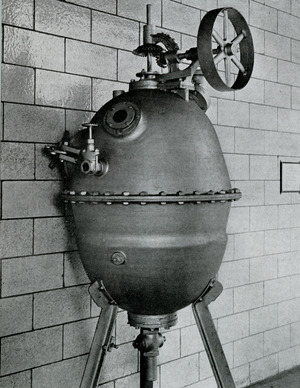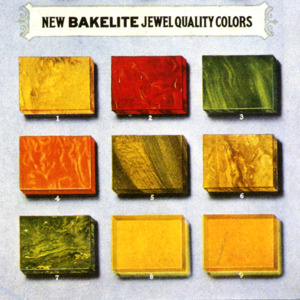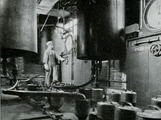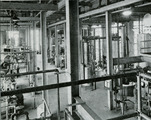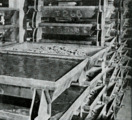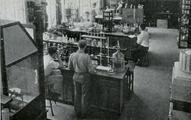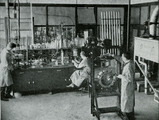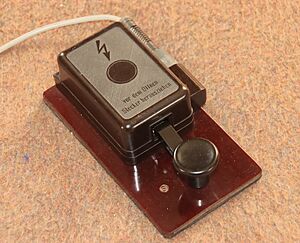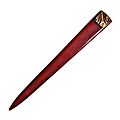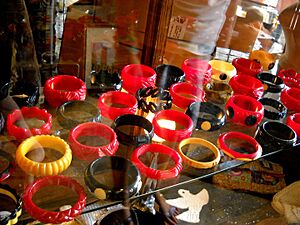Bakelite facts for kids
Quick facts for kids Bakelite |
|
|---|---|
 |
|
| Identifiers | |
| CAS number | |
| SMILES | Oc0ccccc0Cc0cc(C1)c(O)c(c0)Cc0c(O)ccc(c0)Cc0ccc(O)c(c0)Cc0c(O)ccc(c0)Cc0c(O)ccc(c0)Cc0c(O)c(C2)cc(c0)Cc0c(O)ccc(c0)Cc(c0O)cc2cc0Cc0cc(Cc2ccc(O)cc2)c(O)c(c0)Cc0c(O)ccc(c0)C1 |
| Properties | |
| Molecular formula | |
| Molar mass | 0 g mol-1 |
| Appearance | Brown solid |
| Density | 1.3 g/cm3 |
| Thermal conductivity | 0.2 W/(m·K) |
| Refractive index (nD) | 1.63 |
| Thermochemistry | |
| Specific heat capacity, C | 0.92 kJ/(kg·K) |
| Except where noted otherwise, data are given for materials in their standard state (at 25 °C, 100 kPa) | |
Bakelite is a special type of plastic. It was the very first plastic made completely from man-made ingredients. A chemist named Leo Baekeland invented it in 1907 in Yonkers, New York. He received a patent for it in 1909.
Bakelite became very popular because it could be shaped when warm and then hardened into a strong, lasting form. It was also great because it didn't conduct electricity and could handle heat well. This made it perfect for many products.
People used Bakelite for things like electrical insulators, radio and telephone cases, kitchen items, and even toys. Today, old Bakelite products are popular collectibles because of their cool, retro look.
This invention was a huge step for the chemical industry. It showed that new, useful materials could be created in a lab. Bakelite's success inspired scientists to create many other types of plastics. Because it was the world's first commercial synthetic plastic, it was recognized as a National Historic Chemical Landmark.
Contents
How Bakelite Was Invented
Scientists first noticed the reaction that makes Bakelite in 1872. However, they didn't think about using it to make a product back then.
Leo Baekeland was already successful from inventing a special photographic paper. He started looking into how certain chemicals, phenol and formaldehyde, reacted together. He wanted to find a replacement for shellac. Shellac was a natural material that came from insects and was hard to get enough of.
Baekeland first made a liquid version called Novolak. It didn't become a big hit, but it's still used today in some ways, like in making computer chips.
He then tried to make wood stronger by soaking it in a new kind of resin. By carefully controlling the heat and pressure on phenol and formaldehyde, he created a hard, moldable material. He named it Bakelite, after himself. This was the first man-made plastic that would harden permanently once heated. Baekeland imagined it could be used for "a thousand and one" different things. He tried adding materials like cotton and wood fibers to make it even stronger.
Baekeland filed many patents for his invention. He announced his discovery to the American Chemical Society in 1909. Soon after, he began making Bakelite in his home lab. He sold it as a material for electrical parts. By 1910, he had enough success to open a company in the U.S. to make and sell Bakelite.
At first, the company also made clear Bakelite for things like pipe stems and jewelry. But the demand for molded plastic items grew quickly. So, the company focused more on making things by molding.
In 1922, several companies joined together to form the Bakelite Corporation. They advertised Bakelite as "the material of a thousand uses." They even created a special logo with the letter B above an infinity symbol.
Bakelite could be made in many colors, including black, brown, red, yellow, green, and blue. It also came in different forms. These included clear material for jewelry, glues for light bulbs, varnishes for electrical coils, and molding material for countless useful and beautiful items.
After Baekeland's patents ended in 1927, other companies started making similar plastics. These new plastics, like Catalin, could be made in brighter colors than the dark Bakelite.
How Bakelite Is Made
Making Bakelite involves several steps. First, phenol and formaldehyde are heated with a special chemical called a catalyst. This creates a liquid product.
If you heat this liquid more, it becomes partly solid. But if you keep heating it, it turns into a very hard, solid material. However, heating it too much in the open air can make it foamy and brittle.
Baekeland's clever idea was to heat this mixture under high pressure in a special egg-shaped machine called a "Bakelizer." Heating it at about 150°C (302°F) under pressure stopped the foaming. This process created a super hard material that couldn't be melted or dissolved.
Molding Bakelite Products
To make molded Bakelite, phenol and formaldehyde are mixed with a filler material, like wood flour. This mixture is then put under high pressure and heat for a few minutes. This process creates a hard plastic. In the past, asbestos was sometimes used as a filler, but it is no longer used due to safety concerns.
Molding Bakelite had many benefits. The Bakelite resin could be used as a powder or in pre-shaped pieces, which made the molding process faster. Also, once molded, Bakelite objects had a smooth, shiny surface, so they didn't need much extra work. Millions of parts could be made quickly and cheaply.
Bakelite Sheets
Another way Bakelite resin was used was to make strong sheets. A Bakelite sheet is a hard, dense material made by pressing layers of paper or cloth together with synthetic resin under heat and pressure. This process turns the layers into a very strong, permanent plastic.
Bakelite sheets come in many types, with different additives. These are used for various needs, like mechanical strength, electrical insulation, or heat resistance. For example, some types are reinforced with paper or canvas for different uses.
What Makes Bakelite Special
Bakelite has several important features. It can be molded very quickly, which saves time in manufacturing. The molded items are smooth, keep their shape, and are tough against heat, scratches, and many chemicals. It also doesn't conduct electricity well, which is a valuable property. However, it is not flexible.
If you rub or burn Bakelite, it has a distinct, strong, sweet, or sometimes fishy smell.
How Bakelite Was Used
Bakelite's special qualities made it perfect for many uses. It was great for molding, as a glue, a varnish, and a protective coating. It was especially useful in the growing electrical and car industries because it was so good at resisting electricity, heat, and chemicals.
One of the first commercial uses of Bakelite was for small electrical insulating parts in 1908. Soon, it was used for non-conducting parts in telephones, radios, light bulb sockets, and car distributor caps. By 1912, it was even used to make billiard balls because it felt and sounded like ivory.
During World War I, Bakelite was used a lot, especially in electrical systems for things like airplane engines and early radios.
Because Bakelite was easy and fast to mold, it helped make telephones and radios more affordable. This meant more families could have them. It was also very important for the car industry. Soon, Bakelite was found in countless other products, from pipe stems and buttons to camera casings. It was also commonly used for parts of firearms, like grips.
Starting in the 1920s, Bakelite became a popular material for jewelry. Famous designers like Coco Chanel and Elsa Schiaparelli used Bakelite for bracelets and special dress buttons.
By the 1930s, Bakelite was used for game pieces like chess pieces, poker chips, and dominoes. Kitchen items made with Bakelite were popular because they resisted heat and chipping. It was even used in early solid-body electric guitars.
During World War II, Bakelite was used in many military items, including pilot goggles and field telephones. It was also used for patriotic jewelry. In 1943, people even thought about using Bakelite to make coins in the U.S. because metal was scarce.
By the late 1940s, newer materials started to replace Bakelite in many areas. Today, Bakelite is less common in everyday products because it can be expensive to make and is brittle. However, it is still used where its special properties are needed. You can find it in small, precise parts, saucepan handles, electrical plugs, switches, and printed circuit boards. It's also used for billiard balls, dominoes, and board game pieces because of its look, durability, and sound.
Bakelite is still used for wire insulation, brake pads in cars, and industrial electrical parts. It is also used to prepare metal samples for scientific study.
-
A Bakelite domino.
Collecting Bakelite Items
Old Bakelite items, especially jewelry and radios, have become very popular with collectors.
Sometimes, the word "Bakelite" is used to describe many different types of old plastics. This includes plastics like Catalin and Faturan, which can be very colorful.
Because people love the look of Bakelite, there are even modern "fakelite" items. These are made from newer, safer materials that look like old Bakelite.
Other Similar Plastics
- Catalin is a plastic similar to Bakelite. It uses different fillers, which allows it to be made in bright, light colors.
- Faturan is another plastic like Bakelite. It naturally turns red over time, no matter what its original color was.
- Galalith is an early plastic made from milk products.
- Micarta is an early material that used Bakelite as a glue. It was developed in 1910 and used for things like fan blades.
See also
 In Spanish: Baquelita para niños
In Spanish: Baquelita para niños
 | Jewel Prestage |
 | Ella Baker |
 | Fannie Lou Hamer |


